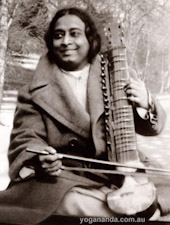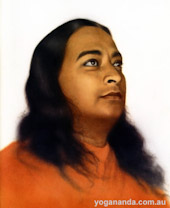DEVOTION (2)
Excerpts from Devotional Way To God by Paramahansa Yogananda
Chant to Awake Devotion
 Chanting is another way of awakening devotion. The great devotee Ramprasad realized God through his devotional songs; as did Sri Chaitanya, who danced in ecstasy as he sang the name of God.
Chanting is another way of awakening devotion. The great devotee Ramprasad realized God through his devotional songs; as did Sri Chaitanya, who danced in ecstasy as he sang the name of God.
"O Divine Mother, I don't have to use flowers and incense and these other external offerings to arouse my love for Thee. When I say Thy name, that is all that is necessary. My heart is locked in love for Thee. My body cannot move; my breath cannot flow without Thee." The devotee who feels God as the only reality existing within him, and himself existing in God, is united with God, one with God in unconditional union. That devotee inwardly perceives: "When I eat, I am eating for Him. When I serve, my hands are His. When I speak, my voice is His. It is God who is feeling and loving through me." Such a devotee looks after the body as the temple of God. He realizes that it is God who has incarnated in the body. ...
"I am happy doing only God's will; serving Him who is residing for a time in this body, and who is in the forms of all." So this is a different aspect of devotion: To do everything completely detached, while striving and enjoying only to do the will of God. Even if anything untoward happens to the body, the devotee is anxious to make it right only because God is in that bodily temple.
When you are worshiping in external ways, your mind is outside, and God is hidden variously behind the dense barriers of material objects. But when you are worshiping God in the temple of silence within the body, you are right there with Him—your consciousness touching His Consciousness. Self-Realization Fellowship shows you the way to this inner communion with God who is veritably enthroned in the depths of the heart.
Concentration Techniques
Yogis concentrate here at the Christ or Kutastha center in the middle of the forehead, the seat of concentration for the practice of scientific techniques of God-communion.
Those who call to Him only with devotion concentrate at the heart center, the center of feeling. On this point there is always a controversy between the bhaktas and the yogis. When you are perceiving God, there is both love and wisdom. Love and wisdom become one and the same. When you have wisdom, you have love. When you have love, you have wisdom.
There is no separate pole. So by concentrating initially at either the heart center, as do the bhaktas, or the Christ center, as do the yogis, God can separately be felt. Then in that actual communion with Him, these two poles come together; there is no separateness anymore of the two centers; heart and mind are as one.
When you are absorbed in love for God, His response is there at the heart center, a tremendous feeling of calmness and divine joy welling up in the heart that draws your attention or concentration to that center. That feeling in the heart is like a great comet of light; and in that light is the love of God. It is that feeling which you should concentrate on in the heart. Those who are in earnest about God are aware of these subtle spiritual experiences. As soon as I concentrate on the heart, I feel that light, that glow of God's all-consuming love.
Love for God Brings Perception of God
 If you have that love for God which brings actual perception of Him, you do not require the formal discipline of renunciation. It becomes automatic; all lesser desires and attachments fall away. The selfish man is not a man of God, because he is always thinking of the desires of the ego apart from God. Renunciation is the means by which God can be known, but it is not the end in itself. Love is much greater than mere renunciation. Love is a joyous giving. When that is in the heart, there is no pain in parting with anything. When renunciation for its own sake is uppermost, the devotee rationalizes, "Why should I part with this or that?" He discriminates in giving. Renunciation is made to seem so terrible that few want to follow it. But when love for God is there, then even the renunciant has no feeling of renunciation. You gladly do without anything or everything for love of God. The most enjoyable way of life, whether as a monastic or a householder, is to be in love with Him.
If you have that love for God which brings actual perception of Him, you do not require the formal discipline of renunciation. It becomes automatic; all lesser desires and attachments fall away. The selfish man is not a man of God, because he is always thinking of the desires of the ego apart from God. Renunciation is the means by which God can be known, but it is not the end in itself. Love is much greater than mere renunciation. Love is a joyous giving. When that is in the heart, there is no pain in parting with anything. When renunciation for its own sake is uppermost, the devotee rationalizes, "Why should I part with this or that?" He discriminates in giving. Renunciation is made to seem so terrible that few want to follow it. But when love for God is there, then even the renunciant has no feeling of renunciation. You gladly do without anything or everything for love of God. The most enjoyable way of life, whether as a monastic or a householder, is to be in love with Him.
The devotee who is in love with God says, "Even though I don't see You, Lord, I know You are right behind my thoughts. I could not think or reason without You. I could not will without You. I could not walk or speak without You. So, Lord, I know You are here with me all the time, behind my brain, behind my love, behind my whole existence; and that is why I love You." When you are conscious of His presence within you and that your whole being is solely dependent on Him, that is the devotional way to God. If you have this awareness of His immanence, how could you be selfish when you see Him in everyone? He who loves God, loves God in everyone. ...
Pure Unselfish Love
When I love someone, I gladly suffer pain for that person. With God's permission I have taken on the karma of others to lessen their suffering. Pure unselfish love in God's love is a most wonderful state of consciousness. It is an ecstasy day and night. God richly rewards His devotees. But the word "reward" is obnoxious to me, because I do not seek a reward from God. Since He has given me unconditional love to possess as my own, I want to give that love to Him. Even if for a thousand years He does not reply, what of it? Give your love to God just the same, without even asking, "Come to me." Give to Him without condition.
In the devotional way to God, the devotee says, "Lord, I will be happy in the giving of my love to You, even though my offering may be inadequate. I am not seeking for Your response; I am not asking You to receive my love. Whether or not You receive it, whether or not You respond, I am glad just to give my unconditional love to You; that is all. It is my greatest happiness. Unceasingly I give that love to You, and to Your manifested Presence in the temple of flowers and all nature, in the temple of friends and loved ones, in the temple of devotees, in the temple of my soul. I know that as You have made me in Your image, I am one with You always. Even if You never reply to me, I give my love to You, my Lord, and shall keep on giving unto eternity. That is all I know."
He who is a true lover of God stands by Him equally during sunny days of joy and dark days of trials. Why not? Those who are in love are day and night thinking only of their beloved one. So is this romance with God. It is the most wonderful existence you can ever imagine.
Singlehearted Devotion
By singlehearted devotion, O son of Pritha (Arjuna), that Supreme Unmanifested is reached. He alone, the Omnipresent, is the Abode of all creatures.
—The Bhagavad Gita VIII:22
The sole gift a human being may present to the Infinite Giver is love. To bestow that gift on God, or miserly to withhold it, is man's only private power. All else already belongs to the Maker of heaven and earth. By pure humble bhakti man becomes fit to enter even the ultimate haven, the Immutable and Unmanifested.
(God Talks With Arjuna: The Bhagavad Gita by Paramahansa Yogananda)
Page 2 of 3